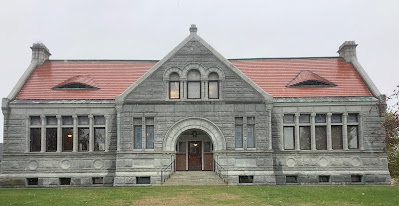There are six ferries a day to Vinalhaven, fifteen miles out in West Penobscot Bay, where the lone Carnegie Library on an island resides. If I didn’t make the third ferry of the day at 10:30 I’d have to take the noon ferry and return on the 3:15 pm ferry, the last of the day, arriving back in Rockland after sunset. I was so intent on making that 10:30 ferry I set my alarm for 5:45.
I was camped thirty-three miles away with lots of climbing ahead of me. I had hoped to get to within thirty miles, but I had my first flat since the beginning of these travels over two thousand miles ago half an hour before dark. I hurriedly replaced the tube, deflated by a patch gone bad at a most inopportune time, and continued riding until it was too dark to continue.
There were more hills than I would have liked on my morning push to make the ferry, arriving with just five minutes to spare. Twelve cars boarded before me, as many as the ferry could accommodate. Bikes are charged $17.50 for a round trip, and the passenger goes free. I, of course, was the lone cyclist. About halfway there when we reached open water the ferry began swaying dramatically. I had to lay down and curl up to ward off the motion-sickness I am prone to. I nearly fell asleep I was so depleted from the effort I’d sustained to start the day. After twenty minutes or so when the ferry came within the embrace of Vinalhaven I could arise and appreciate our picturesque entry to the ferry dock.
There were more hills than I would have liked on my morning push to make the ferry, arriving with just five minutes to spare. Twelve cars boarded before me, as many as the ferry could accommodate. Bikes are charged $17.50 for a round trip, and the passenger goes free. I, of course, was the lone cyclist. About halfway there when we reached open water the ferry began swaying dramatically. I had to lay down and curl up to ward off the motion-sickness I am prone to. I nearly fell asleep I was so depleted from the effort I’d sustained to start the day. After twenty minutes or so when the ferry came within the embrace of Vinalhaven I could arise and appreciate our picturesque entry to the ferry dock.
I had an hour and forty-five minutes to check out the library and explore the island a bit before the 1:30 ferry back. The library was less than a mile away past a harbor full of boats. There were stacks and stacks of traps for lobsters, the primary source of income for the island’s 1,400 residents, which doubles in the summer months. The Prairie-style library, the lone such in Maine, was constructed of granite quarried on the island back when that rivaled lobsters for the island’s chief income. The high-quality granite lives on in many prominent buildings including Chicago’s Board of Trade, the State Department building in the nation’s capital and the Washington Monument there, and the Brooklyn Bridge.
When I began the day I had hoped I might arrive in Rockland well enough before the 10:30 ferry so I could visit its Carnegie enabling to be directly on my way out of town when I returned from Vinalhaven to pile up the miles in the ninety minutes before dark. But since I arrived in Rockland with no time to spare I had to visit its library after Vinalhaven, cutting into that valuable riding time.
I arrived in Lewiston over an hour later than I expected having to make a detour up to Augusta. Dark was closing in. The library was just off a narrow street that was a virtual pedestrian walkway lined with shops and cafes. The substantial granite building was overwhelmed by a huge multi-story addition to serve the city’s 37,000 residents, second most in the state.
I was lucky there was a wide shoulder on the road to the Econo Lodge, and also that I had brought along a reflective vest, which I have gotten a lot more use of than I ever expected. With it dark by 4:30 and less than ten hours of light a day, I very much need it. I was passing through a forest that called out to be camped in, but I didn’t dare. And no worries of the Econo Lodge being full, as it was a huge two-story complex with only a few cars and large trucks from the nearby Maine Turnpike parked down the two long flanks of rooms. There is no precipitation in the forecast for the next week, so hopefully this is my last indoor sleeping until I stop in on Laura and Ken in Williamstown in five days.













2 comments:
It is interesting that, as America's only Carnegie Library history sleuth, you are uncovering some hidden truths about this venerable institution. I think it's time for a book to unmask their stately facades!
I’m doing the research. You’re the man with the credentials to write it.
Post a Comment